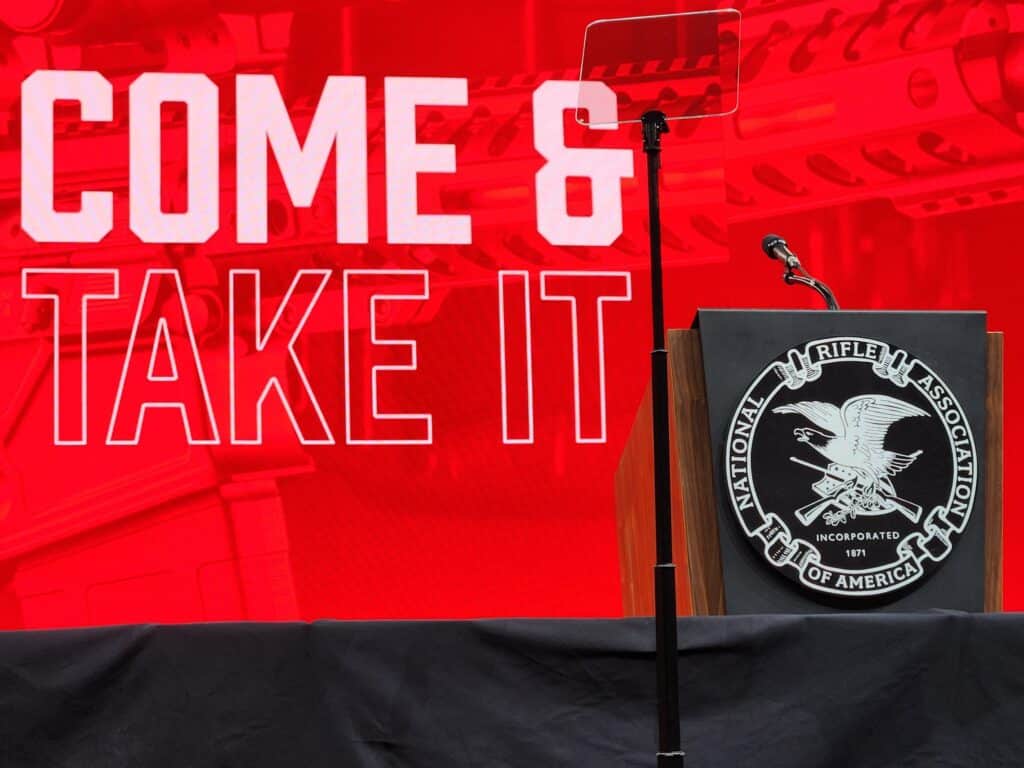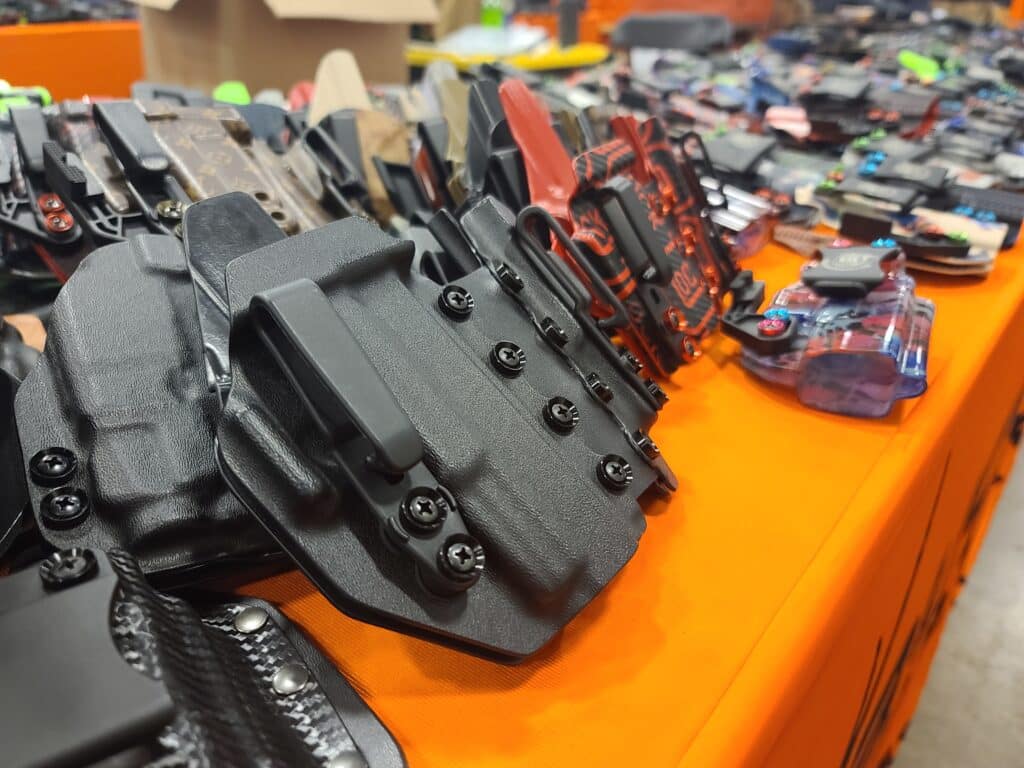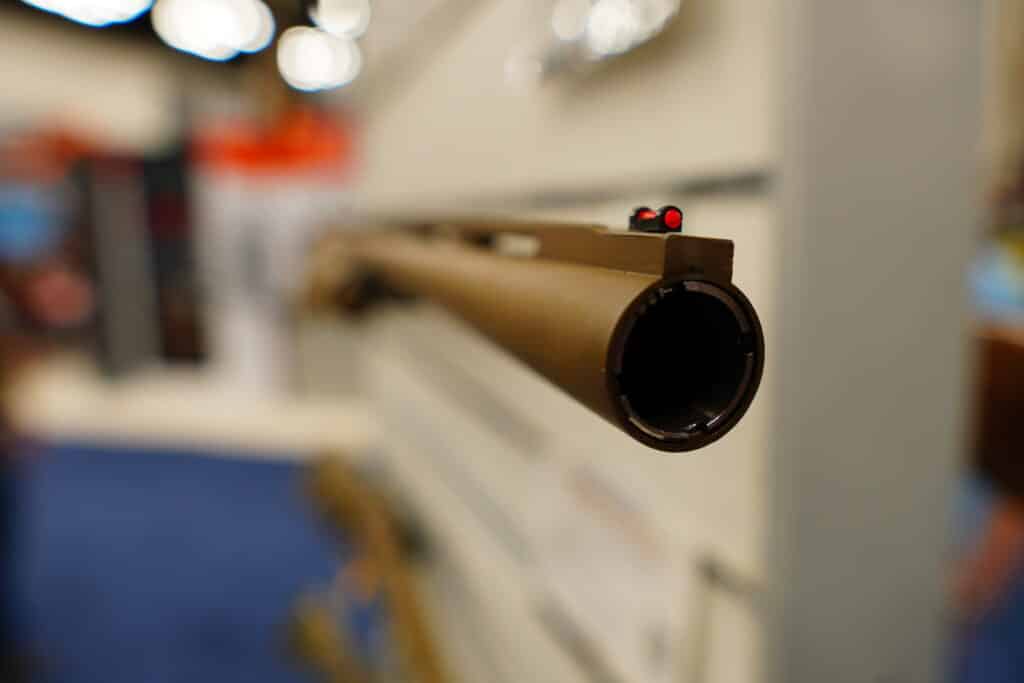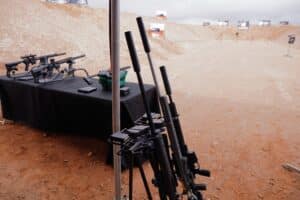I’ve been to a lot of NRA board meetings over the past six years, but never one that went as long as Saturday’s did. In fact, it bled over into Sunday. What was being debated will have a tremendous impact on the future of the nation’s largest gun-rights group.
As we reported on Friday, the board was set to decide the details of the reform package it planned to send to the judge in its long-running civil corruption case, as well as its relationship with outside counsel Bill Brewer. Both of those happened, but that doesn’t necessarily mean the view of the group’s future is clear.
While I’m out in Texas, Contributing Writer Jake Fogleman took a look at a complex decision on Hawaii and California’s Bruen-response laws. The federal appeals court upheld, for the first time, one of those state’s “vampire rule” but not the other’s.
Then we have my piece on how the Crumbley convictions predicted the prosecution of the Georgia school shooter’s father. I thought that might develop into a trend, and now it has.
Plus, The Dispatch’s Steve Hayes joins the podcast to discuss how the Georgia shooting will impact the 2024 election.

Marathon NRA Board Meeting Ends With Reform Proposal
By Stephen Gutowski
Irving, Texas — A 15-hour meeting of the National Rifle Association’s board of directors ended just after midnight on Saturday with a reform plan.
The meeting, which was in a confidential executive session for nearly 12 hours, produced a proposal the board will send to New York Attorney General Letitia James and Judge Joel Cohen in an effort to finalize the group’s long-running civil corruption case. However, details of the proposal were not made public. Doug Hamlin, the new CEO and Executive Vice President of the NRA, said the meeting went so long because there was significant disagreement over the right approach, and the NRA wouldn’t immediately make details of the proposal public because it was part of ongoing litigation.
“During the marathon session today, there was not universal agreement on all the major issues discussed,” Hamlin told The Reload. “On some of the tactical elements, there wasn’t an entire consensus. However, we do agree that the primary goal is to return the NRA to its rightful place in American society.”
While details of the proposal weren’t made public at the end of the meeting, they likely address the reforms suggested by Judge Joel Cohen during his bench ruling in July. The judge denied James’s request for a court-appointed monitor to oversee the NRA’s operations. However, he also banned Wayne LaPierre from working for the group for ten years and said the NRA should implement additional reforms.
He proposed turning “some or all” of the reforms suggested by the NRA’s Audit Committee on the eve of trial into a court order. He suggested “expand[ing] the path” in order to avoid “unhealthy entrenchment.” Cohen said the NRA should hire an in-house consultant to “recommend best practices.” He also recommended barring those on the Audit Committee during the corruption allegations from serving in leadership roles on that committee. He also said the NRA should reduce the size of its board because large boards can be “unmanageable.”
Judge Cohen then left it up to the two parties to work out the details of those reforms, which he would then turn into a court order. If the two sides can’t agree, the judge will settle whatever disputes they have over the details.
Multiple sources on the board told The Reload that efforts to unfurl the Special Litigation Committee, which oversees the group’s legal strategy and representation in the New York civil corruption trial, failed. The committee, made up of former President Charles Cotton, current President Bob Barr, and longtime board member David Coy, will continue to oversee that work for the foreseeable future. Additionally, the Brewer law firm will continue to represent the NRA as the group works toward resolving the civil case.
Board members wouldn’t discuss details of what happened during the confidential executive session. However, during the open session of the board that preceded it, there was a debate over adding a section to the agenda to discuss the committee’s role that indicated a two-thirds vote would be required to enact significant changes. It appears those looking to disband or reshape the committee couldn’t meet that threshold.
The Brewer firm and its namesake, Bill Brewer, have played a key role in the NRA’s fight with New York over the past half-decade. The firm has devised and carried out most of the gun-rights group’s legal strategy during that time. That has made the firm a polarizing figure inside the organization, with members of leadership and supporters of previous CEO Wayne LaPierre backing it while newer reformers criticizing its approach and the more than $180 million the NRA has paid the firm.
The rest of the board’s open session was dominated by the group’s new compliance efforts, attempts to stabilize staff and bring back members, and its political operations. It featured presentations from the group’s new director of compliance about progress on its newly implemented safeguards. The head of the Institute for Legislative Action, the NRA’s political arm, also spoke on the group’s intention to activate 1.5 million gun owners across the swing states who voted in one of the two last elections.
The group said it is still working to schedule another event with Former President Donald Trump before the election.
Hamlin detailed issues with understaffing and loss of outside support facing the group, noting, for instance, that its competition section had declined from 22 staffers to two and a half. He said over 8,000 clubs had ended their affiliation with the NRA during the past six years. However, he also noted the NRA was still far larger than all of the alternative gun-rights groups combined and said the group was moving faster toward recovery than he’d expected.
“NRA 2.0 is ahead of schedule,” Hamlin told The Reload. “In the months of May, June, and July, our membership revenues were ahead of budget for the first time in years. Membership in July was up compared to June for the first time in years.”
The board agreed its next meeting would be held at 9 am central time at the same Omni hotel in Arlington, Texas, on January 11th, 2025.

Analysis: How a Federal Appeals Court Just Blessed a De Facto Gun-Carry Ban [Member Exclusive]
By Jake Fogleman
With a new first-of-its-kind appeals court ruling, the most consistent streak in post-Bruen litigation has now been broken.
A unanimous three-judge panel for the Ninth Circuit Court of Appeals on Friday issued a split ruling on the constitutionality of both Hawaii and California’s so-called Bruen-response bills. In doing so, it upheld lower court injunctions against a handful of newly created “sensitive places” in each state but reversed several others. The ruling, for the first time ever, upheld a default ban on gun carry in publicly accessible private property, which severely limits where even licensed individuals can legally carry.
“In [Hawaii], we affirm the preliminary injunction with respect to financial institutions, parking lots adjacent to financial institutions, and parking lots shared by government buildings and non-governmental buildings,” Judge Susan Graber wrote for the panel in the combined cases of May v. Bonta, Carralero v. Bonta, and Wolford v. Lopez. “We otherwise reverse the preliminary injunction, thereby reversing the injunction with respect to bars and restaurants that serve alcohol; beaches, parks, and similar areas; parking areas adjacent to all of those places; and the new default rule prohibiting the carry of firearms onto private property without consent.”
Dubbed the “vampire rule” by its critics, this provision flips the traditional understanding of private property rights and gun carry on its head. Rather than allow lawful carriers to bring their guns onto publicly accessible private property by default unless the owner says no, as had been the case across the country to this point, these laws make the practice illegal by default unless a property owner provides explicit permission.
These provisions have been featured in the laws passed by states like New York, New Jersey, Hawaii, California, and Maryland aimed at undermining the Supreme Court’s recognition of a right to carry a firearm publicly for self-defense in 2022’s Bruen decision. Because they implicate virtually everywhere a concealed carry permit holder might take a gun outside the home, these provisions are by far the most consequential and controversial component of Bruen-response laws.
Due to their novelty and the scope of their impact on public carry rights, liberal and conservative-appointed judges alike have all blocked versions of the rule in the various legal challenges before now. Here’s a look at how the panel simultaneously upheld Hawaii’s version but left California’s version blocked.
Rahimi’s Impact
The panel decided to use a looser interpretation of the Bruen test because of the Supreme Court’s recent ruling in US v. Rahimi. Unlike most courts confronting all manner of Second Amendment cases in the aftermath of Rahimi, who have tended to either downplay its impact on Bruen‘s analysis or ignore it entirely, Judge Graber said Rahimi softened the test for gun laws.
“The Court’s analysis in Bruen misled some courts into imposing too rigid a test when considering historical sources,” Graber, a Bill Clinton appointee, wrote. “In Rahimi, the Court clarified that Bruen did not require stringent adherence to Founding-era laws, emphasizing that its ‘precedents were not meant to suggest a law trapped in amber.’”
“Rahimi therefore instructs that, even where historical analogues are not close matches to the challenged law, they may evince principles underpinning our Nation’s regulatory tradition, and it is sufficient for the government to show that its law is consistent with those principles,” she added.
She also drew a distinction between the level of stringency required in cases like Bruen, which dealt with the type of gun restriction that did not exist at the founding, and modern sensitive places laws, versions of which were in existence when the Second Amendment was ratified.
“We pause to note the difference between the ‘distinctly similar’ test applied in Bruen to New York’s law and the more lenient standard that applies when analyzing the regulation of firearms at ‘sensitive places,'” Graber wrote. “After all, only one or two colonial laws provided sufficient justification for the Court to designate several places as sensitive. The Court placed schools in this category, even though no law prohibited firearms in schools until more than thirty years after the ratification of the Second Amendment. By contrast, when Bruen applied the ‘distinctly similar’ test to New York’s proper-cause law, the Court’s analysis was more stringent.”
Therefore, she reasoned, the panel was permitted to treat a relatively small number of laws as a representative tradition for modern sensitive places bans, even though the Supreme Court had written piecemeal laws off as outliers in Bruen.
“The relevant tradition—regulation of firearms at sensitive places— existed at the Founding,” she wrote. “When examining whether a particular place falls within that tradition, a small number of laws, even localized laws, can suffice, if those laws were viewed as non-controversial.”
Historical Analysis of the “Vampire Rule”
In her historical analysis of the private property default ban, Judge Graber first drew a distinction between California’s version and Hawaii’s.
“Although the state statutes are similar, they differ in one key respect,” she wrote. “Hawaii’s law allows a property owner to consent orally, in writing, or by posting appropriate signage on site. California’s law, by contrast, allows a property owner to consent only by ‘clearly and conspicuously post[ing] a sign at the entrance of the building or on the premises indicating that licenseholders are permitted to carry firearms on the property.'”
She then surveyed the historical record and produced two laws she said represented an “established tradition” for the Vampire Rule: a 1771 New Jersey law prohibiting the carrying of firearms on any lands owned by another without “License or Permission in Writing” and an 1865 Louisiana law prohibiting “carry[ing] fire-arms on the premises or plantation of any citizen, without the consent of the owner or proprietor.”
While it isn’t clear if those laws were meant to apply to businesses open to the public like the modern private property provisions, Graber determined that they were historical “dead ringers” for the idea that governments have always been able to alter the default rules that apply to carrying guns on private property. However, she also held that, unlike Hawaii’s provision, California’s law fell outside this tradition due to its narrow requirement that property owners post signs of a particular size to grant permission to gun carriers.
“We find no historical support for that stringent limitation,” she wrote. “None of the laws forbade a person from obtaining permission only by convincing the owner to post signs of a specific size. Nor do modern circumstances appear to justify California’s imposing a much more stringent consent requirement; ordinary signs existed in 1791, in 1868, and today.”
Therefore, the panel reversed the lower court injunction against Hawaii’s Vampire provision while leaving the order blocking California’s intact.
Finally, Graber acknowledged the panel’s approval of Hawaii’s provision as an outlier among all the other courts to have reviewed de facto private property gun bans. She again pointed to Rahimi to help explain that discrepancy.
“We acknowledge that our primary holding—that a national tradition likely exists of prohibiting the carrying of firearms on private property without the owner’s oral or written consent—differs from the decisions by the Second Circuit and some district courts,” Graber wrote. “In reaching our limited conclusion, we carefully have examined the record in the Hawaii case and, to the extent that our decision conflicts with the analysis by other courts addressing the likelihood of success in those cases, we respectfully disagree with their preliminary, pre-Rahimi analyses.”
As a result, once the panel issues its order, virtually all publicly accessible property outside of banks and certain parking lots will be presumptively off-limits to gun carriers in Hawaii. Presumably, a similar situation could soon be true for California gun owners as well if the state’s legislature chooses to amend its law to remove the narrow language requiring signage.
Importantly, the opinion only deals with an interlocutory appeal and is therefore not likely to be the court’s final word on the matter. The gun-rights groups who filed these cases in Hawaii and California will undoubtedly keep fighting in court to reduce the number of “sensitive places” approved by the court.
But in the meantime, a panel of judges in the largest appellate circuit in the country has given early approval to a practice that functionally nullifies the Supreme Court’s recognition of a right to public gun carry.
Podcast: The Dispatch’s Steve Hayes on the 2024 Gun Debate, Georgia School Shooting Fallout
By Stephen Gutowski
This week, we’ve got one of the nation’s premier political analysts on the show.
Steve Hayes, co-founder of The Dispatch, joined us to discuss the state of the 2024 gun debate. He gave his take on the path Kamala Harris and Donald Trump have taken in their respective campaigns. Then he turned to how the recent mass shooting at a Georgia High School might shake up those positions.
Hayes noted guns have not been a top priority for voters thus far in the election. He said that was likely because there haven’t been a lot of high-profile shootings this year. He argued that could change because of the new attention the Georgia shooting will bring to the issue, but he wasn’t sure if it would reach the level of intense media coverage that’s necessary to push either candidate one way or the other.
You can listen to the show on your favorite podcasting app or by clicking here. Video of the episode is available on our YouTube channel. An auto-generated transcript is available here. Reload Members get access on Sunday, as always. Everyone else can listen on Monday.
Plus, Contributing writer Jake Fogleman and I discuss what the shooting means for the trend of criminally charging the parents of mass shooters. We also talk about a new political ad campaign launched by gun-control group March for Our Lives and Ben & Jerry’s targeted at voters in swing states. We wrap up with some original reporting on the upcoming NRA board meeting, where the group is potentially set to vote on an internal reform program and consider separating from its longtime outside legal counsel, William Brewer.

Analysis: A Trend in Charging the Parents of School Shooters [Member Exclusive]
By Stephen Gutowski
The father of the Apalachee High School shooting suspect has been arrested and charged with numerous crimes related to the murder spree. The prosecutors bringing those charges appear to be following in the footsteps of their Michigan counterparts who secured convictions against the parents of the Oxford High School shooter.
After Jennifer Crumbley was convicted of involuntary manslaughter under the theory that her negligence led to her son murdering four of his fellow students, rather than any direct involvement in the attack, I predicted we’d likely see more cases down the line. The conviction marked a success for the first of its kind charges, but I reasoned it also wouldn’t be the last time we saw a case like that.
“The more common way we’ll likely see these lines tested in the wake of Jennifer Crumbley’s conviction is through prosecutors pursuing similar charges,” I said at the time. “The outcome in this case will probably embolden prosecutors to go after parents of other mass shooters and lower-profile killers.”
I argued the next test case was the one against her husband, which also ended in a conviction. Now, Georgia prosecutors are trying the same and creating a bit of a trend. But it’s one that may still be connected to particularly egregious conduct on the part of the parents involved.
In the Crumbleys’ case, they didn’t actively assist their son in carrying out his attack, but they seemed to do everything they could to enable it. From ignoring his bizarre behavior to buying him a handgun they were unable to keep secure to brushing off a meeting at the school about disturbing images and threats he’d left on a worksheet just hours before he started shooting, they acted in a seriously irresponsible way. They also offered up little contrition or regret, with Jennifer even testifying she wouldn’t have done things differently in retrospect.
That was enough for a jury to find their negligence was so bad it rose to the level of criminality.
On the other hand, the parents of the shooter who murdered ten people at Santa Fe High School in 2018 were recently found not liable for their son’s actions in civil court. That case didn’t feature the same kind of sensational warnings, like the morning-of school meeting in the Crumbley’s cass. And the guns had been stored in a locked safe and cabinet, though the shooter was still able to get access to them to carry out his deadly attack.
The jury apparently had a harder time holding the parents responsible for the son’s actions in that case.
What happened during the leadup to the Georgia shooting is not yet completely clear. Much of the reporting is preliminary and early details of these fast-moving breaking news stories can often be incorrect or other details that change the full picture can emerge weeks or even months later. Still, the early reports indicate the actions of the father may be closer to those of the Crumbleys than the Santa Fe parents.
For one, he received a warning from the FBI and the local sheriff’s office there was reason to believe his son had made school shooting threats just over a year ago.
“In May 2023, the FBI’s National Threat Operations Center received several anonymous tips about online threats to commit a school shooting at an unidentified location and time,” the FBI said in a statement. “The online threats contained photographs of guns. Within 24 hours, the FBI determined the online post originated in Georgia, and the FBI’s Atlanta Field Office referred the information to the Jackson County Sheriff’s Office for action.”
The sheriff’s office said the son denied making threats, and the office didn’t have probable cause to make an arrest. It also said the father claimed his son “did not have unsupervised access” to the firearms then in the home.
Colin Gray, the father of the accused shooter, is now facing four counts of Involuntary Manslaughter, two counts of Second Degree Murder, and eight counts of Cruelty to Children. The Georgia Bureau of Investigation said those charges are related to the son’s access to the gun used in the shooting.
“Colin Gray knowingly allowed his son, Colt Gray, to possess a gun,” the police organization said. “Due to the active investigation, we’re unable to release further details.”
Additionally, CNN reported Gray bought the rifle specifically for his son in the months after he was suspected of making school shooting threats.
“Colin Gray told investigators this week he had purchased the gun used in the killings as a holiday present for his son in December 2023, according to two law enforcement sources with direct knowledge of the investigation,” the news outlet reported on Thursday. “One source told CNN the AR-15-style rifle was purchased at a local gun store as a Christmas present.”
Time will tell wether those reports stand up over time or if they are enough to secure a conviction in court, especially since it isn’t a crime in Georgia to allow a minor unsupervised access to a rifle the way it is for a handgun. But the charges ensure we’re going to find out the answer to those questions. And they’ve established a new trend in how law enforcement responds to school shootings–at least those where the parents appear to have been especially negligent.
That’s it for now.
I’ll talk to you all again soon.
Thanks,
Stephen Gutowski
Founder
The Reload







